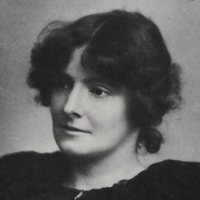Two Voices
COUNTRY
‘SWEET are the lanes and the hedges, the fields made red with the clover,
With tall field-sorrel, and daisies, and golden buttercups glowing;
Sweet is the way through the woods, where at sundown maiden and lover
Linger by stile or by bank where wild clematis is growing.
Fair is our world when the dew and the dawn thrill the half-wakened roses,
Fair when the corn-fields grow warm with poppies in noonlight gleaming,
Fair through the long afternoon, when hedges and hay-fields lie dreaming,
Fair as in lessening light the last convolvulus closes
’Scent of geranium and musk that in cottage windows run riot,
Breath from the grass that is down in the meadows each side the highway,
Slumberous hush of the churchyard where we one day may lie quiet,
Murmuring wind through the leaves bent over the meadow byway,
Deeps of cool shadow, and gleams of light on high elm-tops shining,
Such peace in the dim green brake as the town, save in dreams, knows never,
But in, through, under it all, the old pain follows us ever—
Ever the old despair, the old unrest and repining.
‘Dark is the City’s face; but her children who know her find her
Mother to them who are brothers, mindful of brotherhood’s duty;
To each of us, lonely, unhelped, the grave would be warmer, kinder,
Than the cold unloving face of our world of blossom and beauty.
Poverty deep and dark cowers under the thatch with the swallows,
Cruel disease lies hid in the changeful breast of the waters,
Drink sets snares for our sons, and shame digs graves for our daughters,
Want and care crush the flower of a youth that no life-fruit follows.
‘What are the woodland sweets—the meadow’s fair flowery treasure—
When we are hungry and sad, and stupid with work and with sorrows?
Leisure for nothing but sleep, and with heart but for sleep in our leisure;
The work of to-day still the same as yesterday’s work, and to-morrow’s.
Ever the weary round—the treadmill of innocent lives—
Hopeless and helpless, and bowing our backs like a hound’s to the lashes;
What can seem fair to the eyes that are smarting and sore with the ashes
Blown from the fires that consume the souls of our children and wives?
‘Dreams sometimes we have had of an hour when we might speak plainly,
Raise the mantle and show how the iron eats into our bosom,
The rotting root of the Nation, the worm at the heart of its blossom,
Dreaming we said, ’We will speak, when the time for it comes, not vainly.’
Ah—but the time comes never—Life, we are used to bear it,
Starved are our brains and grow not, our hands are fit but for toiling,
If we stretched them out their touch to our masters’ hand would be soiling;
Weak is our voice with disuse—too weak for our lords to hear it!’
CITY
‘So has the spark died out that the torch of hope dropped among you?
So is the burden bound more fast to the shrinking shoulder?
Far too faint are your cries to be heard by the men who wrong you?
And if they heard they are high, and the air as men rise grows colder!
Yet you are men though so weak, and in mine and workshop your brothers,
Stronger in head, and in heart not less sad, for deliverance are striving;
These will stand fast, and will face the cruel unjust and ungiving,
And you in our ranks shall be ’listed, our hands fast clasped in each other’s!
‘For in the night of our sorrow cold lights are breaking and brightening
Out in the eastern sky; through the drifting clouds, wind-driven,
Over the earth new gleams and glories are laughing and lightening,
Clearer the air grows each moment, brighter the face of the heaven.
Turn we our face to the east—oh, wind of the dawn, blow to us
Freshness and strength and resolve! The star of old faith grows paler
Before the eyes of our Freedom, though still wrath’s red mists veil her,
For this is our battle day; revenge, like our blood, runs through us.
‘This is our vengeance day. Our masters, made fat with our fasting,
Shall fall before us like corn when the sickle for harvest is strong:
Old wrong shall give might to our arm—remembrance of wrong shall make lasting
The graves we will dig for the tyrants we bore with too much and too long.
The sobs of our starving children, the tears of our heart-sick mothers,
The moan of your murdered manhood crushed out by their wanton pressure,
The wail of the life-long anguish that paid the price of their pleasure,
These will make funeral music to speed the lost souls of them, brothers!
’Shoulder to shoulder we march, and for those who go down mid the fighting
With rifles in hand and pikes, and the red flag over them flying,
Glad shall our hearts be for them—who die when our sun is lighting
The warm, wide heavens, and sheds its lovely light on their dying.
Fight, though we lose our dearest—fight, though the battle rages
Fiercer and hotter than ever was fight in the world before:
We must fight—how can men do less? If we die, what can men do more?
And the sun of Freedom shall shine across our graves to the ages!’

